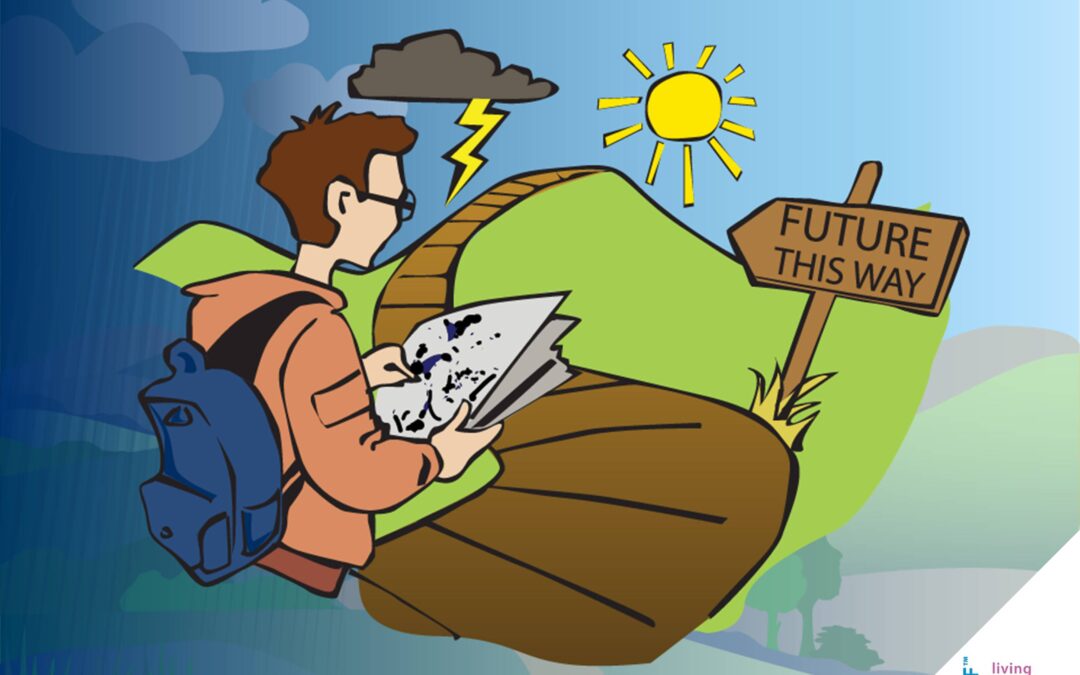Written by the Living Life to the Full team
Debt – Impact on mood and what can you do to relieve debt related stress
The last few years have caused us to face many challenges. All of us have had to adapt our lifestyles as we adjusted to new norms and restrictions related to the Covid 19 pandemic. This has brought many financial and social challenges. In spite of government support many have experienced reduced income.
Recently one large event seems to have followed another with Brexit, followed by the Pandemic, and now the war in Ukraine. Understandably, these uncertainties may leave us feeling anxious and down.
In addition, there has been a huge economic impact resulting from these world events. If you have been struggling before, then the current large increases in oil, heating and food prices may be causing you to feel overwhelmed by money worries or debt problems.
Anxiety and Debt
Feeling anxious or ill at ease is a normal response to threatening events. So, if you are facing reduced hours/income, or have lost your job or are struggling with debt for other reasons, then you may notice you are feeling, behaving, or thinking in ways that are unfamiliar. You may find your mind is dominated by worries about money- and the impact this has on you, or others you care for. What we think affects how we feel- so we may feel stressed and anxious. Emotional feelings can then affect our bodily sensations – with physical tension, aches and pains – and perhaps other physical impacts such as not sleeping well, feeling tired and exhausted, off our food (leading to weight loss)-or the opposite craving food and comfort eating (leading to weight gain)- and more. Finally, all of these changes can add up to alter our behaviours.
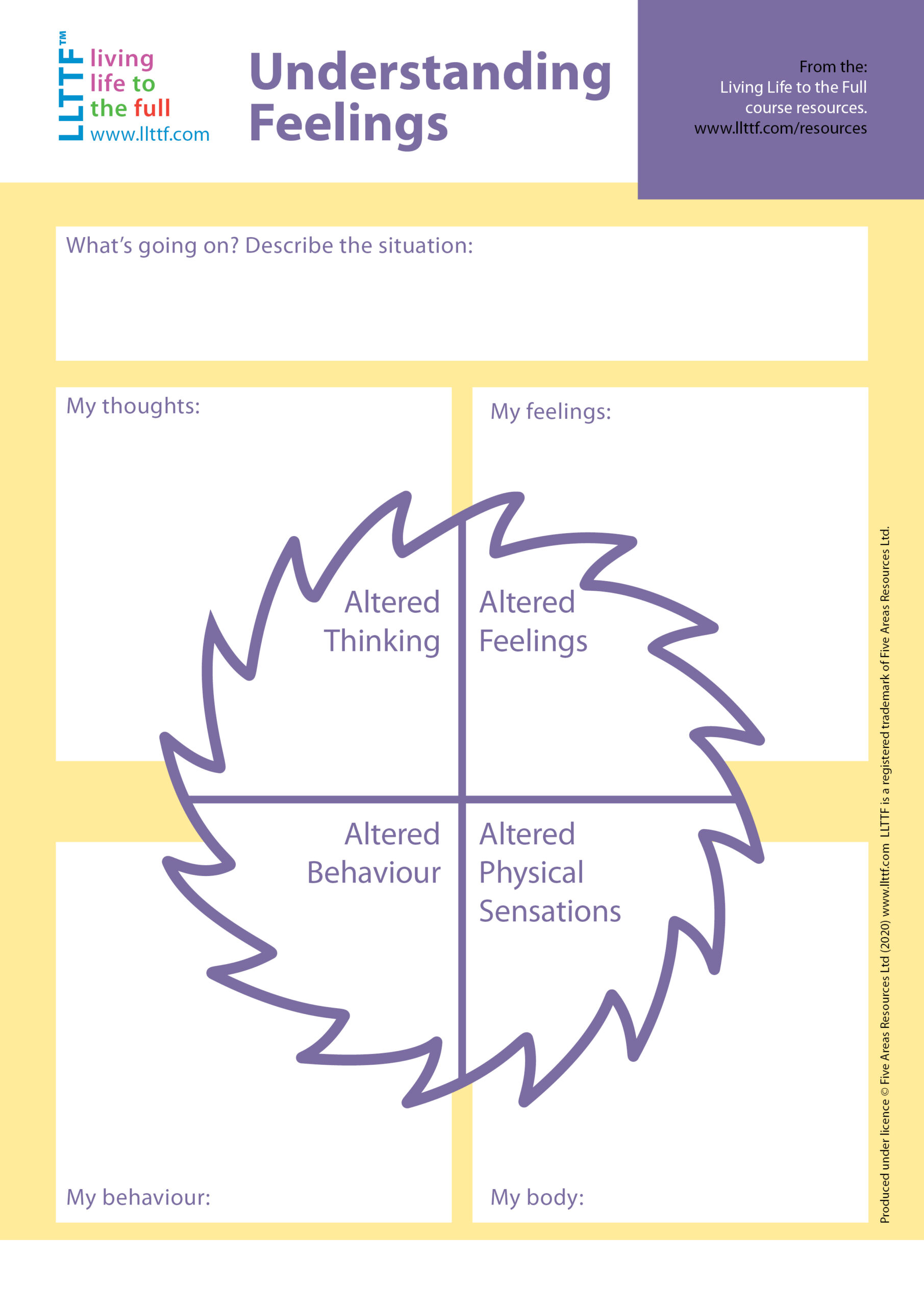
Worksheet available at https://www.gmlifeskills.com/ (free access for people living in the NHS Greater Manchester area).
The good news is we can break this “vicious cycle” by tackling the problem of debt we face using a practical problem-solving approach. Or by altering how it affects us inside by making changes in our thinking, our feelings, in our bodies or behaviour.
Let’s look at how this could apply to times when we are worried about debt. There are ways to help you manage how you think and feel about that debt, how you respond to the worry/stress (your behaviours), and how to manage the problem of debt itself (problem solving).
Here are some things you can change that can make
a difference.
Avoidance
When faced with accumulating debt and not knowing what you can do about it, it’s easy to get bogged down and avoid dealing with it. However, it’s important to keep trying and not just hope it will go away.
When we feel stressed or worried about something it can be tempting to avoid whatever it is we fear. This is understandable and sometimes it makes sense if it’s avoidance of a dangerous situation. However, if we start to avoid dealing with our debt because it feels too big an issue to tackle, we can get caught up in a vicious cycle of avoidance whereby we initially feel a sense of relief, but if this becomes a repeated habit then the avoidance can add to our problems. So, if we stop opening letters and bills it means interest can build up and up. We may end up being blocked from using the bank- and be threatened with losing our accommodation, car (if on finance) or utilities. In the case of utilities check on your rights and responsibilities of utility companies by visiting Citizen’s Advice webpage.
Debt can also affect our relationships, and how we see and judge ourselves too. For all these reasons and more it makes sense to try and respond differently to the challenge of debt.
What to do:
- Connect: Share your problems with trusted friends. Reconnect with them and seek out the support they might offer.
- Get the basics right: When you’re under pressure – do the basics. Try to sleep regularly, eat regular meals, and look after yourself. Watch your drinking.
- Start addressing things you are unhelpfully avoiding: Build up activities again in that area in a planned step by step way.
- Use the Face-it-Planner Worksheet to slowly re-build your confidence.
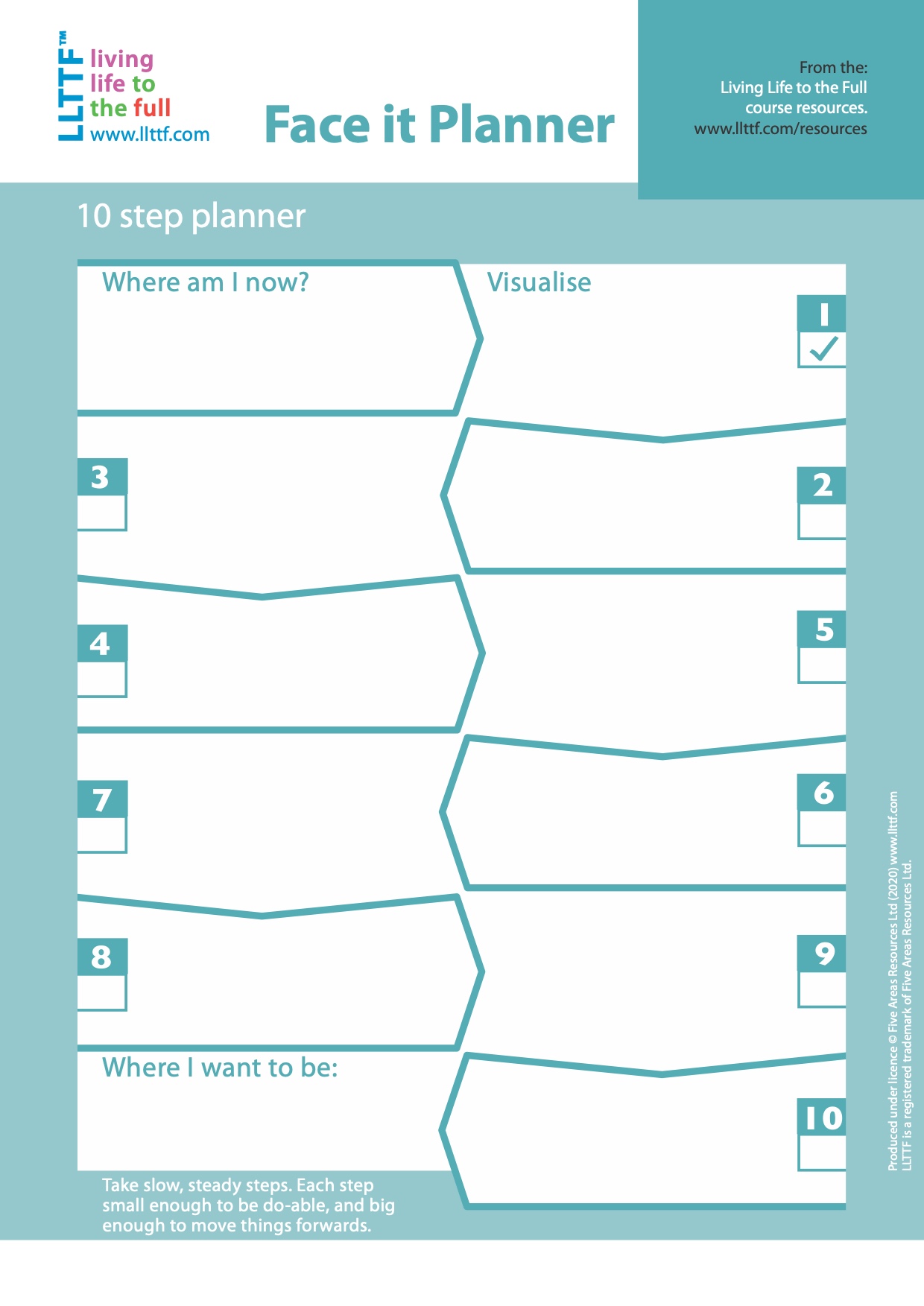
Find out more:
Register and logon to www.gmlifeskills.com and look for the Facing fears and tackling avoidance module in the Living Life to the Full course.
The Impact of Reduced Activity
Avoidance can become very widespread. So, if we feel down and embarrassed by what is happening, then we may avoid meeting or talking with close family and friends. It also means we do less fun activities like hobbies, or seeing friends, or getting out for a walk. The result is that the less we do the worse we feel and the worse we feel the less we do, and our world becomes smaller and smaller. Loneliness and isolation become the norm, and we can feel lower and lower in our mood. And the cycle spins. The good news is the cycle can spin the other way if we know how!
What to do:
- Plan to keep seeing your friends and socialising on a
regular basis. - Build helpful activities such as doing hobbies, playing music, or doing things you enjoy into your life on a regular basis. The key is to balance doing things that give you a sense of pleasure, achievement and closeness/connection to others.
- Establish a daily routine: It’s easy to stay in your bed if you’ve been made redundant or find yourself underneath a pile of debt. But it’s important to keep to a routine, plan to get up and go to sleep ay regular times as well as trying to eat regularly.
Falling into unhelpful patterns of responding
It can be tempting when we feel bad to try and cover over how we feel by blocking those negative feelings by activities such as drinking too much, pushing others away, smoking more, or trying to find quick fix solutions such as gambling with money we don’t have. Sometimes we feel so bad we might take unhealthy risks.
What to do:
Do a self-review using the Things you do that make things worse worksheet.
These activities tend to be done because they make us feel better in the short-term. The problem is that in the longer term it worsens how we feel – emotionally, physically, or socially.
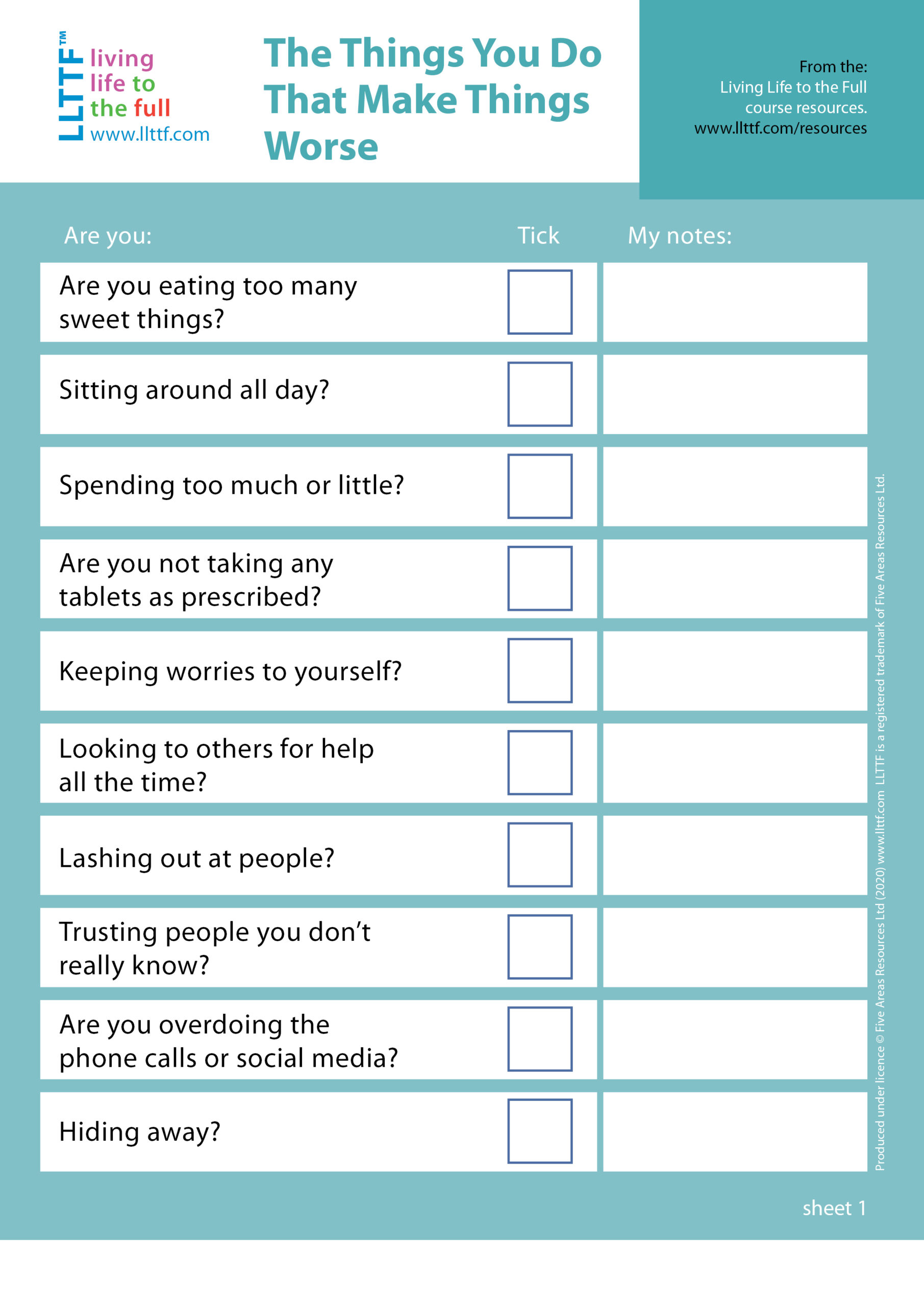
If you have identified that debt is causing you to fall into unhelpful spirals of behaviour, you can start to plan ways of making changes using the Traffic light worksheet.
This worksheet helps you list activities you do that are truly helpful- shown as Green on the sheet. However, watch out for times when your reactions start to make you feel worse. So, if you have “Red” behaviours – where there is a strongly unhelpful impact on you, you can aim to plan to reduce these to an Amber (a milder impact) and eventually to a Green.
So, for someone in debt, perhaps a red behaviour might be if they are drinking heavily every evening to calm themselves and get off to sleep. That might seem to help in the short-term, but in the longer-term alcohol makes their depression and anxiety worse. It also makes sleep worse, leaving the person exhausted in the morning. There are also often physical consequences such as stomach ulcers, indigestion, hang-overs and of course liver disease. Crucially it’s expensive to buy drink adding to the spiral of debt, and can cause harm to relationships and work.
You can find out more about cutting down your alcohol consumption from services listed at the end of the blog.
Remember: If you have drunk at a high level for a long time it’s important to seek medical help when cutting down drink, so you can plan a safe reduction over time.
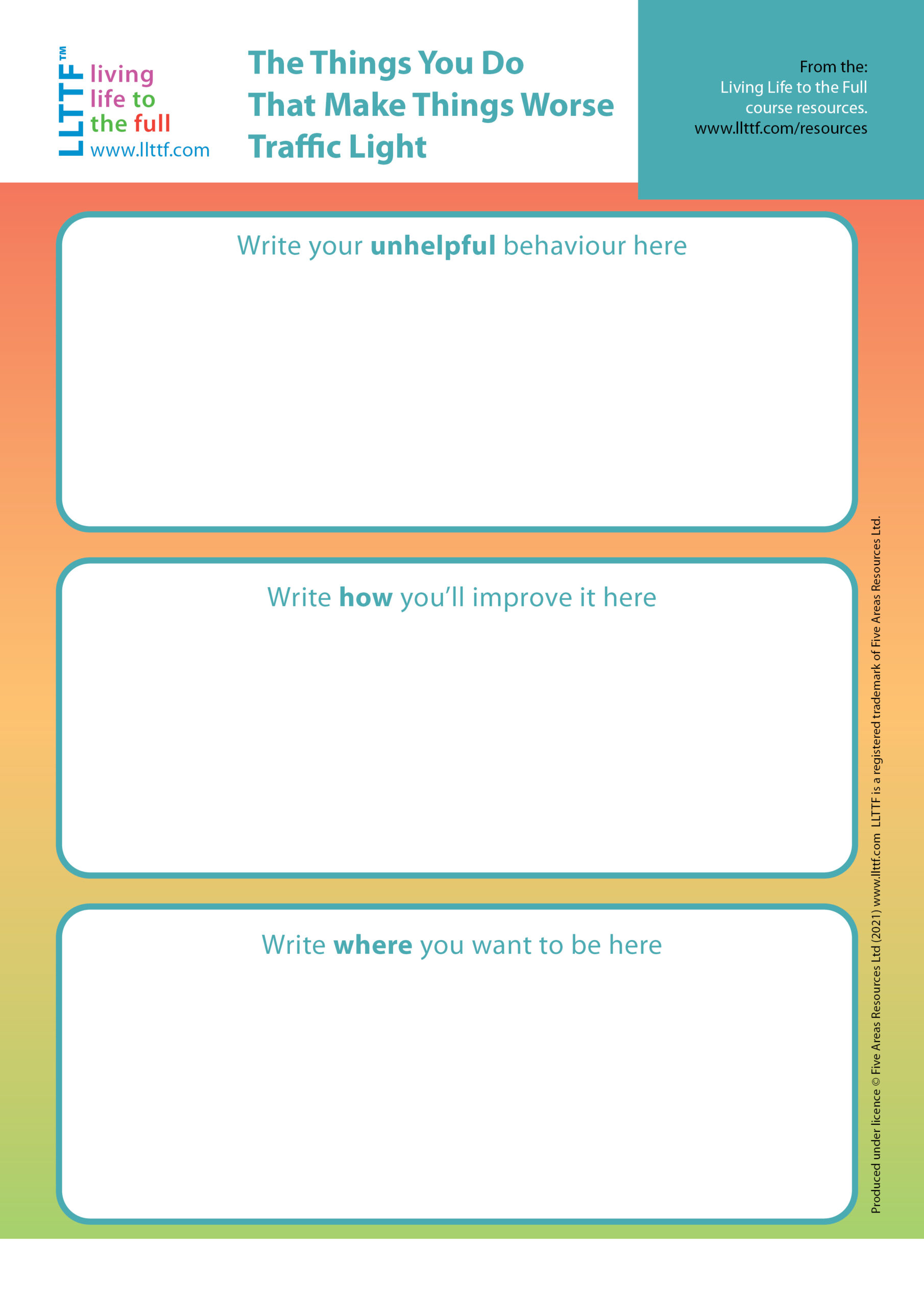
Problem Solving Debt
Debt is a problem- and like all problems it can be dealt with. Start with small achievable changes. Can you cut your shopping bill, do you waste and throw out certain foods’ week after week? Do you have any regular payments like subscriptions that can be cancelled? How much do you spend on food/coffee in cafés or take-aways each week/month? Or other regular things like nights out, cigarettes or alcohol. Can anything be cut back?
A number of apps can help you monitor your income and expenditure. The same analysis tools are sometimes available free of charge through your online bank account.
Or use a paper diary to keep a list of your income and expenditure.
Set a budget so you allocate specific money for specific things (rent, food, clothing, kids etc.)
Think about using Cashback sites, money back credit cards, or supermarket loyalty cards for purchases you need to make.
Think about how you can prioritise your debts. Speak to the experts. Here is the link for Citizens Advice http://www.citizensadvice.org.uk
Reviewing everyday spending is important. For example, cooking homemade meals is not only healthier it can be cheaper too. Plan your menus for the week. Cooking in batches and preparing meals in advance not only makes your week more organised, but you will also have meals portioned and ready. Your shopping bill will go much further, and your meals will be healthier. Research which supermarkets sell food in larger packs at the best price. If you are struggling to pay for food, check out for local food banks, or local funding to help subsidise healthy eating.
Addressing Debt in the Longer-term
You may decide to increase income by getting a job- or changing job. No matter how challenging a time it is for you or your family, keep seeking the right sort of help. If you’ve lost your job stay proactive- keep your CV up to date, register with an employment agency, get benefit advice, and make sure you are getting all the financial support you are entitled to. Talk to the services you are struggling to keep up payments with and try to keep paying the bills and essentials – at least in part if you can get an agreement to repay bills more slowly.
What not to do: Watch out for buy now but pay later offers. Often the amounts paid back are at a high interest rate and you may end up paying much more than the original price – with punishing extra payments if you can’t keep up the required payments.
If you do require to borrow then always talk to a local credit union first Home – SoundPound
Extra reading

 Read the 24 hours to get a job that fires you up- it will help you find a new job that suits you.
Read the 24 hours to get a job that fires you up- it will help you find a new job that suits you.
Or How to fix almost everything- a guide to problem solving.
Both are available on www.gmlifeskills.com
Next steps: Act Now
So, if you’re struggling with debt, don’t put it off…start today to make a plan. Decide what it is you are going to do to help you start managing your debt, and how you are going to do it. Check your plan- is it realistic, something you know you can do.
In your plan, aim at changing just one thing at a time. Make a separate plan for each of the things you want to start doing again. Is your plan slow to make sure you are aiming at one thing and is it realistic? You may find the Planner sheet helpful to help you make effective plans.
1. What am I going to do?
Is it easy? The easier the steps, the more likely you are to do them.
Are you ready to unblock it? What will you do if it goes wrong? If it goes wrong, how will you get round these problems.
If you are really struggling with your debts, and don’t know where to start, Citizens Advice is a good place to get information about benefits, dealing with debt, what you’re entitled to if you’re made redundant, and who to speak to if you are at risk of losing your home.
For more tips visit our website and sign up to our Living Life to the Full course for free at www.gmlifeskills.com
Extra contacts and supports
General Debt Help
www.moneyadviceservice.org.uk lf legal action is being taken against you because you owe money, get free support and advice from:
The Personal Support Unit at www.thepsu.org
The Citizens Advice Bureau at www.citizensadvice.org.uk

